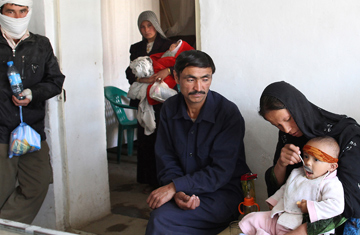
Salamudin, 36, center, waits at a pharmacy in the Afghan town of Bamiyan on May, 30, 2011, with his wife Bakhtawar, 22, and their 1-year-old son Surodin. Salamudin allowed his wife to give birth in a hospital
(2 of 2)
Most of Sayghan district's residents are Tajiks who are Sunni and far more conservative than Bamiyan's main ethnic group, the Shi'ite Hazara. Hazara women were liberated enough to take up arms against the Taliban in the 1990s. The Tajik women rarely leave their homes, Gulpari says, but she's managed to convince some of them to let her help them when they give birth at home. "In 15 years, I've never lost a mother," she says.
Gulpari says she decided to do this work when she was a girl and watched a relative who was a midwife help a scared young woman give birth to her first child. She began apprenticing while the Taliban was running Afghanistan, and many men threatened her for doing what they deemed "dirty work." Now she says even conservative men in her village accept the value of what she does. The Community Midwife Education Program, financed by the U.S. Agency for International Development, has trained thousands of rural Afghan women to work as midwives, according to a recent report by the Council of Foreign Relations think tank.
But in many rural areas, there is still a shortage of midwives — Gulpari says she's only one of four midwives for at least 40,000 people in the area. "I'm not fooling myself," she says. "There are so many women, probably thousands, that I don't see. That I will never see. Some live in ravines deep in the mountains that take days to get to because you can only go by foot or donkey. I'll never know what happens to them."
Even women like Fawzia, the young mother from Ghazni, who are determined enough to get to urban hospitals, face other problems. Many hospitals don't have the money to stock medicine and instead send patients to street markets to buy drugs that are often fake or mislabeled, says Dr. Faizullah Kakar, an epidemiologist and special adviser on health to Afghan President Hamid Karzai. "Even if they are the right drugs, it wastes time to go out and buy them," says the doctor, who has worked with U.S. doctors who trained staff at Kabul's Rabia Balkhi Hospital. The Afghan Safe Birth Project, funded by the U.S. Department of Health and Human Services, has helped reduce deaths during C-sections at the hospital by 80% between 2008 and '10 by providing medicines as well as good training, says Dr. Kakar. The project at Rabia Balkhi was supposed to be a model for other Afghan women's hospitals to follow. But in April, the U.S. government cut the program's $5.8 million annual funding, and Dr. Kakar says the Afghan government doesn't have the money to keep it going. By October, the hospital will no longer be able to buy medicine. "I'm worried we will once again have an epidemic of mothers dying here," he says.
The doctor is also worried about what the budget cuts will mean for Afghan infants. In 2008, UNICEF reported that 52 out of every 1,000 Afghan infants died within the first two weeks of birth. That's a rate 10 times higher than in the U.S.
More than 22,000 babies are born in Rabia Balkhi Hospital every year. Dr Motaqi, the resident in obstetrics, isn't married and doesn't have children of her own, but the shy, intense doctor often visits the hospital's neonatal unit, which smells like rubbing alcohol and powder. There are healthy babies there, but on a recent afternoon she stops near a boy who is tiny and almost still. His skin is tinged blue, and he flutters his eyelids, which are crusty with dried tears. Dr. Motaqi clasps his miniature hand between her thumb and forefinger. "He was born too soon, and he came out the wrong way," she sighs. "He's going to die."
The doctor walks back to Fawzia, the mother from Ghazni province, who lost her son on the drive to the hospital. "I felt him stop moving," Fawzia says, curled up in her hospital bed. She's sleepy from the anesthesia. Dr. Motaqi sits on the edge of Fawzia's bed and tries to manage a smile.
— With reporting by Karim Sharifi / Kabul; Moneer Nyazi / Bamiyan
This story was partly funded by a Knight Luce Fellowship for Reporting on Global Religion.
